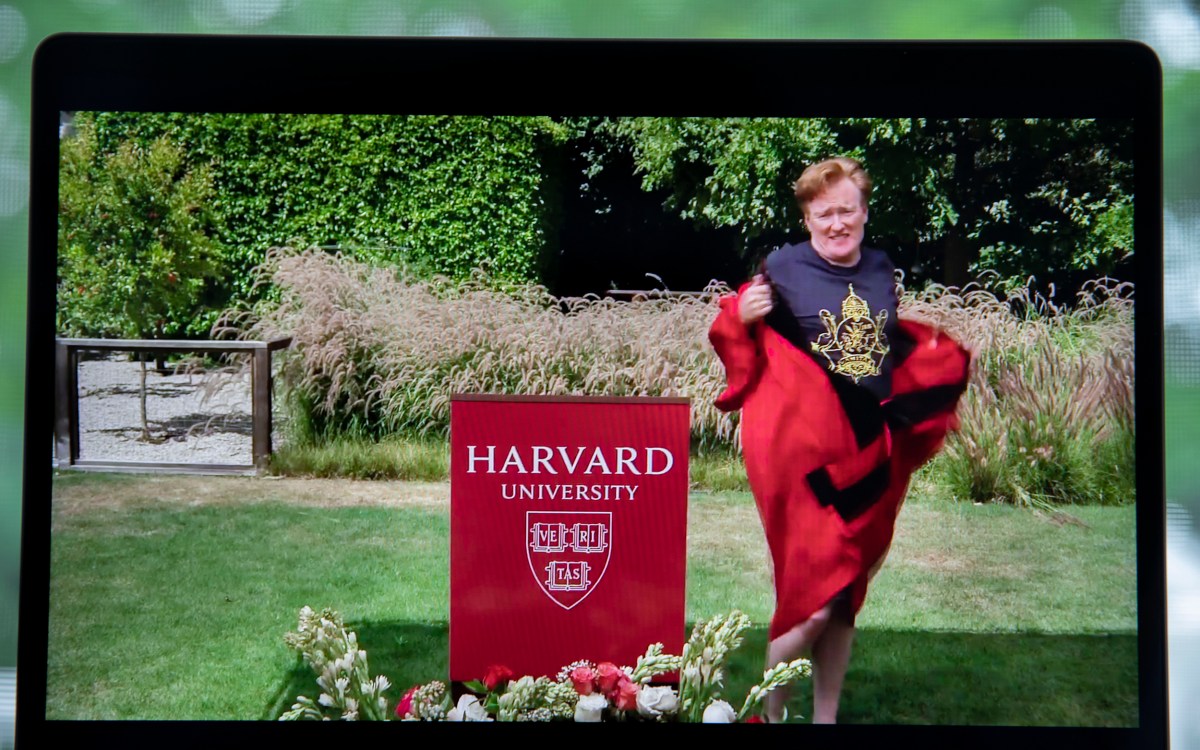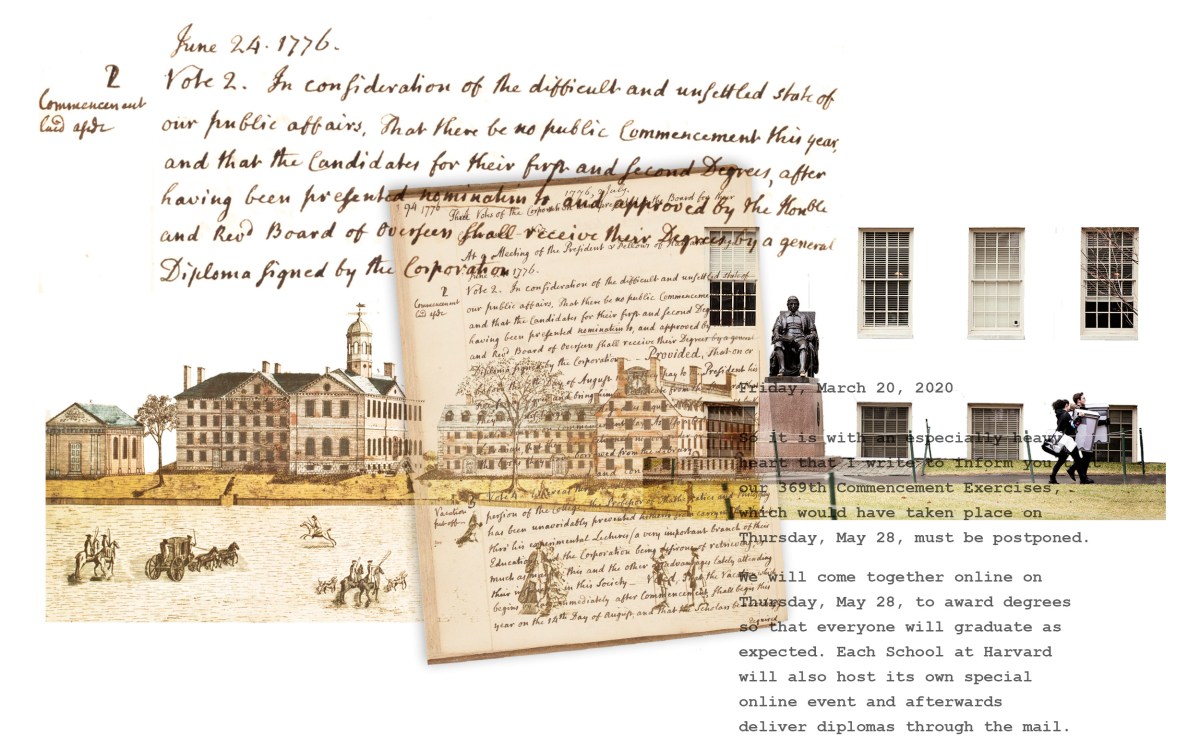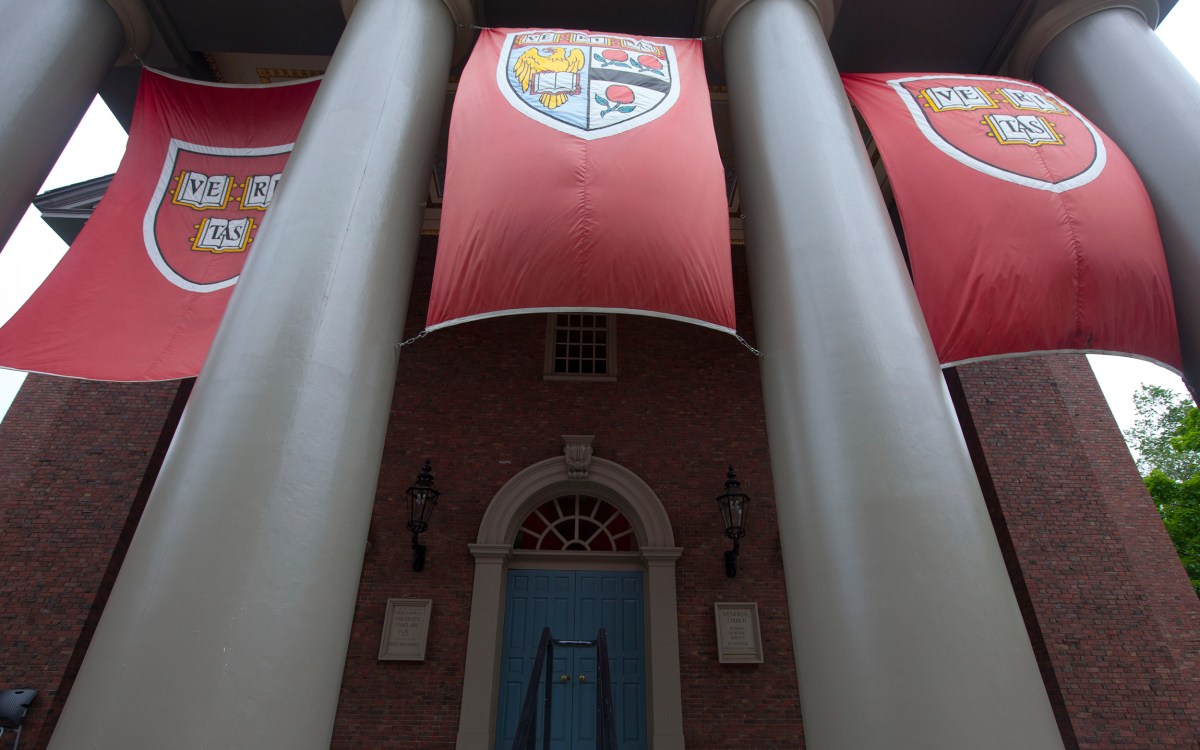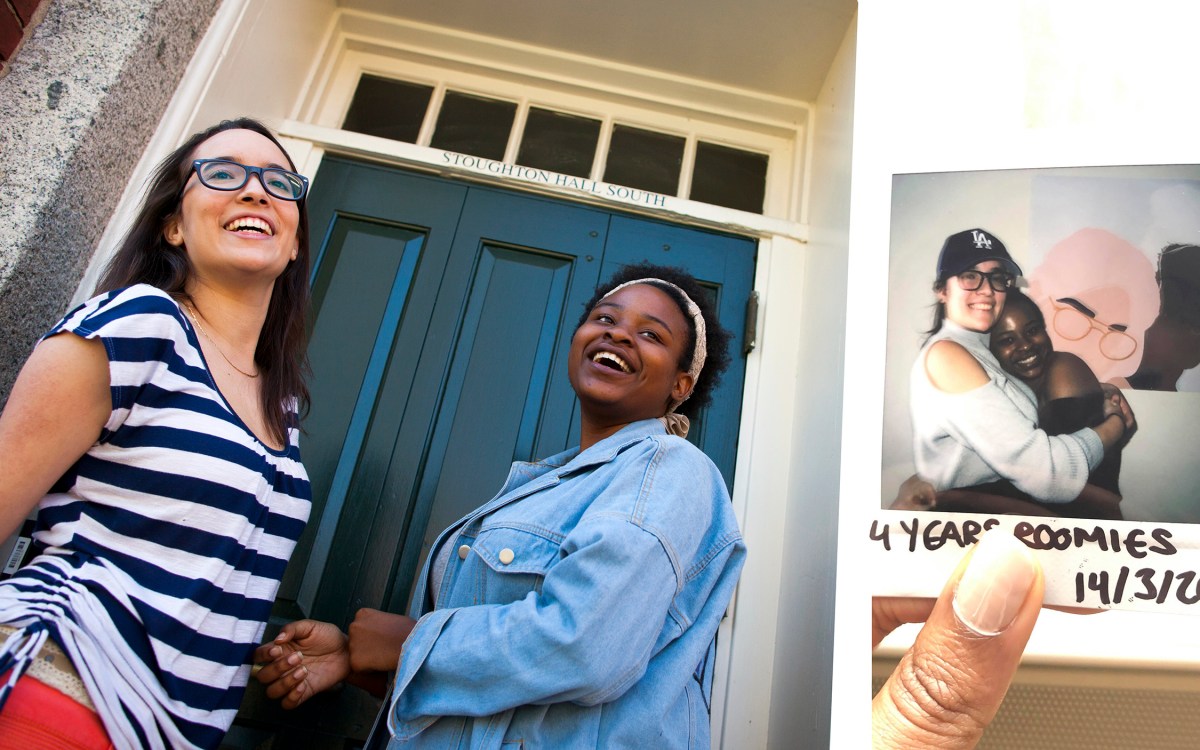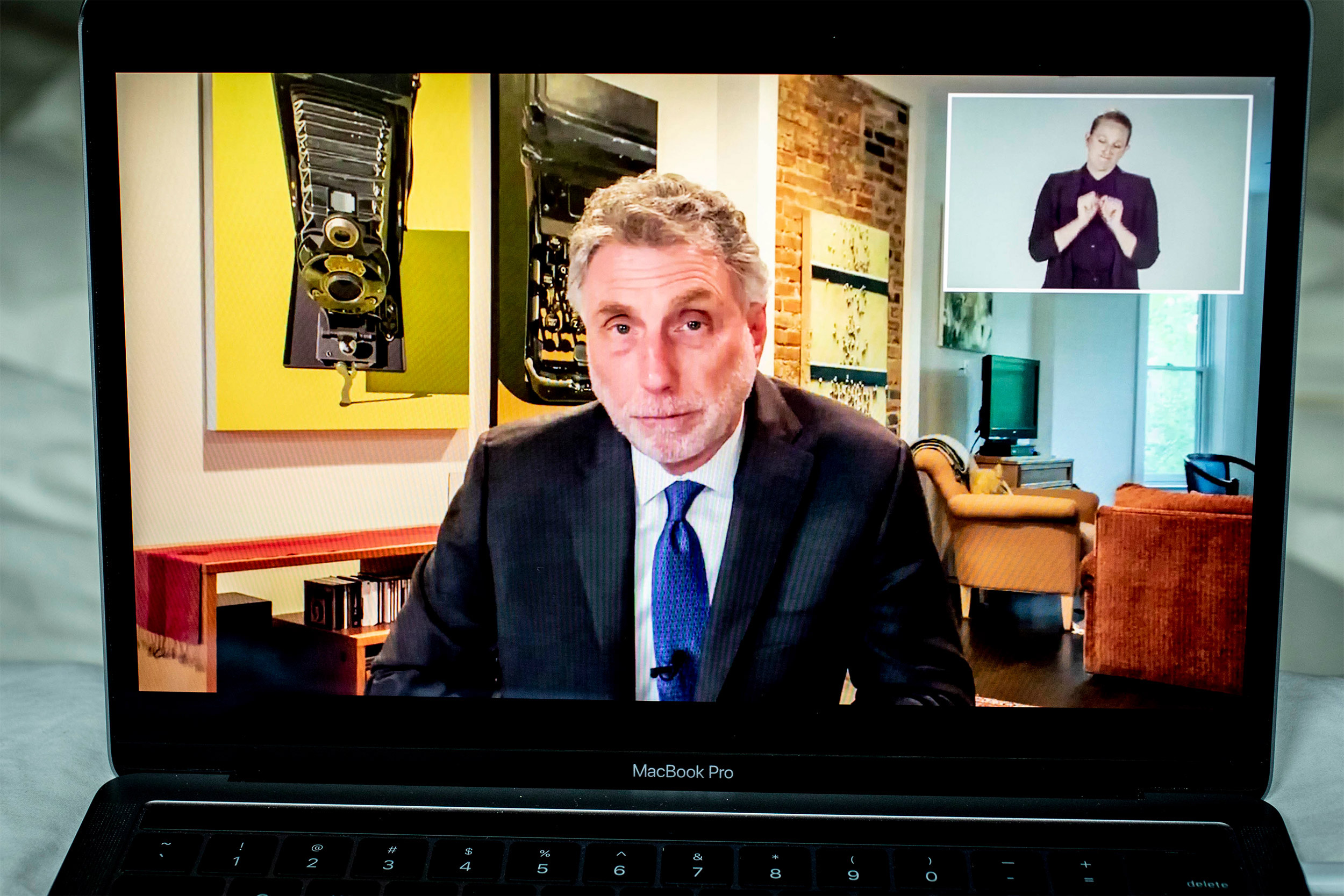
Washington Post executive editor Martin Baron spoke from his home during the online ceremony, Honoring the Class of 2020.
Rose Lincoln/Harvard Staff Photographer
The danger of ‘misinformation, disinformation, delusions, and deceit’
Washington Post’s Baron sends along the Class of 2020 with message that facts, truth matter
Washington Post executive editor Martin Baron offered a ringing defense of facts and the truth on Thursday, telling Harvard seniors who tuned in to an online graduation program for the Class of 2020 that the current coronavirus pandemic has not only underscored the value of accurate, authoritative information but has shown that lies and misinformation can be deadly.
“Only a few months ago, I would have settled for emphasizing that our democracy depends on facts and truth, and it surely does,” Baron said. “But now, as we can plainly see, it is more elemental than that. Facts and truth are matters of life and death. Misinformation, disinformation, delusions, and deceit can kill.”
Baron, who presented his remarks during an hourlong online morning ceremony, said that an independent press — “imperfect though [it] may be” — is key to ensuring that facts are presented and truth defended in society. This is true particularly now, he said, as leaders in much of the world are moving to quash the independent press, and “efforts in this country to demonize, delegitimize, and dehumanize the press give license to other governments to do the same — and to do far worse.”
He also warned that judges, historians, scientists, medical professionals, and other trained experts, once viewed as independent arbiters of facts, are being “devalued, dismissed, and denied. The goal is clear: to undermine the very idea of objective fact, all in pursuit of political gain.”
Baron was the principal speaker at the hourlong virtual celebration, called Honoring the Class of 2020. The event became the pandemic-era substitute for the traditional Commencement ceremonies, when Harvard President Larry Bacow in March postponed the annual in-person gathering until it is safe again to assemble in large numbers.
Harvard’s Commencement exercises typically occupy a full day amid a week of reunions, receptions, pomp, and ceremony. This celebration included remarks by Baron and Bacow, two student speakers, a performance by cellist Yo-Yo Ma and singer Ashley LaLonde ’20, and greetings from Harvard Alumni Association President Alice Hill ’81, Ph.D. ’91, and Harvard Provost Alan Garber. Most meaningfully, the event included the presentation of degree candidates by the deans of the various Schools and conferring of degrees by Bacow.
“I’m sure you’ve imagined this moment for quite some time. But let’s face it, it’s far different than any of us could have predicted when this semester began,” Bacow said. “Two months of pandemic cannot be allowed to overshadow your years of hard work, your many late nights and early mornings, your countless personal pep talks — and let’s face it, we all do them — that turn self-doubt into self-determination. Faced with obstacles, each of you gathered your courage, set your sights, and overcame the insurmountable.”
Bacow told graduates that they should savor their achievements and “rest even for a day upon your laurels” but then to get to work, improving the world for others and ensuring that opportunity — like that given them four years earlier — is available broadly.
“Humanity needs people willing to devote themselves to asking questions, hard questions, sometimes even uncomfortable questions, people who are willing to work hard to perfect this imperfect world that we inhabit, people who care more about others than themselves,” Bacow said. “You are those people.”
The morning celebration, intended for a broader University audience as well as graduates and their families, was viewed by 20,000 as it occurred and 5,000 more during the day. Virtual ceremonies at Harvard’s individual Schools followed it, including speakers such as Conan O’Brien for Harvard College, astronaut Robert Satcher Jr. for Harvard Medical School and the Harvard School of Dental Medicine, and Equal Justice Initiative founder and director Bryan Stevenson for Harvard Law School.
Student speakers during the University-wide event delivered two of the three traditional orations, with the Latin Salutatory held for inclusion a later in-person ceremony. Graduating senior Michael Phillips delivered the Senior English Address, and Sana Raoof, who received her M.D. from the Medical School, delivered the Graduate English Address.
Phillips, a sociology concentrator from Leverett House, recalled the anxieties and insecurities students felt as they found their way during their years at Harvard. He ultimately fell back on his mother’s exhortation, engraved onto three keys she left with him on his first day: believe, fearless, and inspire. He reflected on their meaning, saying that though Harvard graduates likely will be leaders, it remains to be seen what kind of leaders they will be.
“We are once again at a challenging moment, but let us remember that challenges inspire evolution.”
Sana Raoof, Orator
“In the midst of this historic global pandemic, this message carries more weight than it ever has before: Use our powers for good, that by those deeds we might demonstrate that our gifts are not a solemn path to importance but a promise for another person,” he said. “Harvard will change you, but let it continue to change you. Let it make you keenly sensitive to injustice. Let it make you more empathetic to struggle. Let it embolden you to make change.”
Raoof ’12, Ph.D. ’18, spoke of a lesson from her studies of evolution: from challenge comes change. She used Pellegrino University Professor Emeritus Edward Osborne Wilson as an example. A childhood fishing accident left Wilson with impaired vision in one eye, which led to his interest in studying small things up close and eventually to his becoming one of the world’s most eminent biologists. She spoke of her grandfather, who grew up orphaned and poor in India but gained freedom through education — including studies at Columbia University. He began a career teaching, then teaching teachers, and eventually became a director of UNESCO, the United Nations Educational, Scientific and Cultural Organization. While his education enabled his road through life, it wasn’t his education but his hardscrabble roots that drove him, Raoof said.
“What Professor Wilson lost in sight, he gained in vision. My grandfather, powerless in youth, spent his life empowering others,” Raoof said. “We are once again at a challenging moment, but let us remember that challenges inspire evolution. … This pandemic has uncovered the world’s needs. How can we adapt to serve our communities for future generations?”
Serving communities with information and countering government abuse are key functions for news organizations. In his speech, Baron provided context that government and the press have been at odds from the start. He harkened back to 1690, when a Boston newspaper — the first in America — published its first edition. The next day, the governor and council of Massachusetts shut the paper down. The ensuing centuries were no less rocky, with high points of freedom of the press being enshrined in in the U.S. Constitution and the U.S. Supreme Court subsequently protecting that freedom. A free press, Baron said, has revealed many injustices and scandals that those in power would have liked to cover up, from abuse of children by Catholic priests — a story broken by The Boston Globe while Baron was editor — to Watergate, to modern day-slavery in the international fishing industry, to the mistreatment of veterans at Walter Reed Hospital, to the abuses that led to the #MeToo movement.
That’s why the press is among the first targets of power-hungry leaders and under assault today as authoritarianism rises around the world, Baron said. By the end of last year, 250 journalists were in jail globally in nations such as Turkey, Hungary, China, the Philippines, and Myanmar. Saudi Arabia was implicated in the murder of a Washington Post columnist, and more journalists were killed last year in Mexico — five — than in any other country.
Baron concluded by pointing out that Harvard and journalism share core values. “You seek the truth, with scholarship, teaching, and dialogue, knowing that it really matters. My profession shares with you that mission, the always-arduous, often-tortuous, and yet essential pursuit of truth,” he said. “It is the demand that democracy makes upon us. It is the work we must do. We will keep at it. You should, too. None of us should ever stop.”



